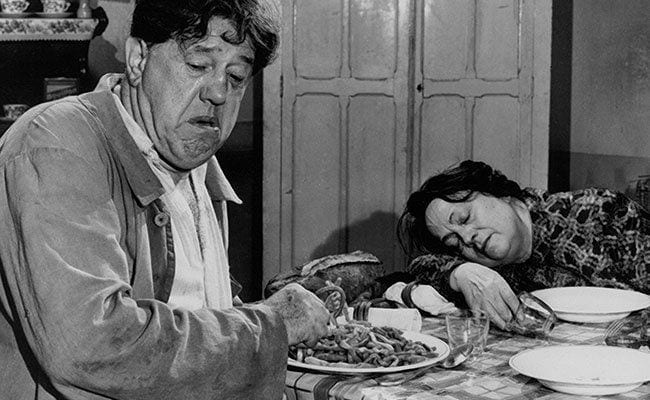
This film is a small, sour masterpiece of provincial satire.
Sacha Guitry is among the most respected and distinctive French filmmakers, yet he remains hardly known outside of France. Andrew Sarris expressed the opinion that what Americans miss in Guitry is what the French miss in Preston Sturges: a pleasure in the language that places acting and dialogue at the center of the film, as opposed to grand stylistic gestures.
In an extra on the new Criterion Blu-ray of La Poison (1951), an associate tells a possibly apocryphal story of a photographer suggesting that a shot begin on the chandelier and pan down to the table, and Guitry supposedly said it wouldn’t make sense because the chandelier doesn’t have any lines. In fact, Guitry’s films are full of playful camera moves when appropriate, just as they’re full of winks at the audience at how artificial are a film’s pleasures.
But we’re almost forgetting to talk about La Poison. This small, sour masterpiece of provincial satire focuses on an older couple who can’t stand each other. In his first Guitry film, Michel Simon, the shaggy hulking irrepressible sacred monster of French cinema, plays farmer Paul Braconnier, whose last name means “poacher”. He’s a shambling lumpen slob, and his wife (Germaine Reuver) is no better. She spends all day getting drunk and plots to poison her husband with rat poison — if she can only work up the courage.
Fortunately, the radio spares them from having to interact more than the bare minimum, and one day Paul hears a Paris lawyer (Jean Debucourt) speaking wittily and philosophically about his record of 100 murder acquittals. In a dialogue sequence of brilliant high comedy, Paul consults the lawyer while pretending to have killed his wife. He’s actually fishing for pointers on the kind of details that could get him off if he goes through with it.
More glittering brilliance occurs in a climactic courtroom sequence that turns the assumptions of the legal system inside out. Here’s one of Guitry’s winks to the audience, for after a particularly ingenious bit of jousting with the judges, Paul tells his lawyer that becoming a criminal must make you smarter because he’s never sounded that brilliant before.
One could argue that Guitry is exposing the hypocrisy of capital punishment or the taboos around divorce, but that may give too much social conscience to a strategy that’s more annihilating. As discussed in the one-hour making-of, Guitry felt bitterness over having been briefly jailed over unfounded accusations of collaborating with the Germans, and his cordially sophisticated venom is simply aimed at the judicial system in general.
Guitry’s sense of cinema comes out in the editing, for he never lets any scene run on theatrically when he can crosscut between two or three simultaneous sequences for illustration and counterpoint. During the trial, for example, he continually cuts to the village children enacting their own parody of the events.
Another essential part of his cinema is his personable credits sequences. Guitry opens the film by parading through a series of scenes in which he praises his actors and crew, showing them all to the audience. He comes across as the boss, which he is, and also as a generous one who values everyone’s contributions. He expresses admiration and affection for the actresses and his female set decorator, and it’s important to remember this in light of what’s to follow.
The title refers not only to literal poison and to the general poisoning of society but to slang for a fishwife. In the liner notes, Ginette Vincendeau observes the misogyny of the wife’s depiction as she’s made to stand for all of life’s humiliations. She doesn’t mention two supporting women in the film who are depicted as wise and friendly, one of whom (Pauline Carton) opens the movie by reading the pharmacist’s order book and passing judgment on the whole village.
It’s easy to forget these women in the face of the wife’s domineering presence, and perhaps it’s also easy to forget that she’s given enough reason to resent her marriage to make her anger and alcoholism unsurprising. Yet she’s not depicted as a shrew waving a rolling pin, but simply as defeated and desperate. Guitry’s cross-cutting gives her almost as much private time on screen as her husband.
The depiction of village life doesn’t rise to the heights of viciousness seen in Henri-Georges Clouzot’s controversial wartime film Le Corbeau (1943), but condemnation is there. The younger business owners, male and female, approach the priest about the possibility of attracting crowds by using one backward daughter in a scheme for a miraculous pregnancy, and they’re delighted when Paul’s notoriety in the papers proves good for trade.
In short, this is a very dark and sardonic explosion of all the polite conventions that grease society — and other movies — and only its Frenchness makes it come off as such a tart cleansing of the palate rather than the bitter insight it really is when you think about it.
This high-definition digital restoration looks and sounds terrific, and the extras include the making-of, an appreciation by Olivier Assayas, and a 1965 TV documentary on Guitry’s career that will make Region 1 viewers eager for more releases.


![Call for Papers: All Things Reconsidered [MUSIC] May-August 2024](https://www.popmatters.com/wp-content/uploads/2024/04/all-things-reconsidered-call-music-may-2024-720x380.jpg)



